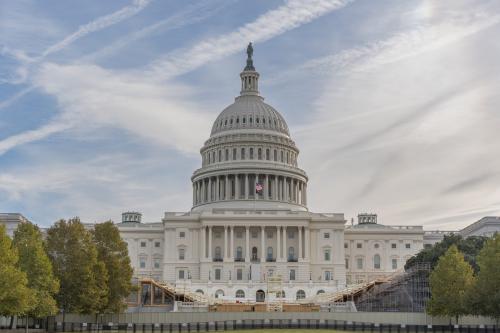Watching the 2020 Republican National Convention is an excruciating experience because it so clearly demonstrates the party’s decay into a slapdash monument to the president’s personal narcissism, undergirded by a fevered pep rally for white supremacist resentments. The RNC abandoned writing any policy platform in favor of a statement of “enthusiastic support” for the decisions of President Trump. Those speakers not directly related to the president described Trump in worshipful terms: “the defender of Western Civilization,” who would guide America on its “path to destiny.” The convention celebrated a white couple who pointed their guns at peaceful protestors and warned that Democrats wanted to “empty the prisons…and invite MS-13 to live next door.”
This spectacle is all the more painful when one remembers what the Republican Party once represented. Still occasionally described today as the party of Lincoln, the Republican Party was also the party of far more radical egalitarians. Rather than dwell further on the vitriol of the contemporary party, it is worth taking the time, at this moment, to recall Republican delegates of one hundred and fifty years ago, when the party was home to extraordinary fighters for racial justice.
A delegate to the Republican National Conventions of 1872 and 1876, Edwin Belcher was, as he put it, “born the slave of my father”—that is, the child of his enslaved mother and the white man who held her in bondage. When the Civil War began, he disguised his race so that he could join the U.S. Army, which had not yet opened military service to black men. He was twice wounded in combat, and spent months in a Confederate prison where, had his deception been discovered, he would have been killed or re-enslaved. After the war, Belcher became one of the early graduates of Howard Law School, helped establish the Republican Party in Georgia, and served in several public capacities including an agent of the Freedmen’s Bureau, a tax assessor, and a state representative. The end of Reconstruction brought an end to his career.
Stephen Atkins Swails represented South Carolina at the Republican National Convention in 1868, 1872, and 1876. He was a member of the famous 54th Massachusetts Infantry, and one of the first African Americans to be made an officer in the U.S. Army. A Northerner, Swails decided after the war to settle in South Carolina, where he practiced law, edited a newspaper, served as mayor, state senator, and as a member of the Electoral College. He was forced from office at the end of Reconstruction, after a white mob attempted to assassinate him. His grave in South Carolina was until recently unmarked.
A delegate to the 1868 Republican National Convention, Benjamin Franklin Randolph, was born to free black parents in Kentucky. He got his degree at Oberlin College and became an educator and then a chaplain in the Union army. After the war, he worked in the Freedmen’s Bureau to set up public schools in South Carolina. He was state senator and a delegate to the South Carolina Constitutional Convention, writing the state’s guarantee of public education and its equal protection clause. In October 1868, he was assassinated, in broad daylight and before witnesses, by members of the Ku Klux Klan. His murderers were never brought to justice.
Alongside more famous Republican delegates, like Frederick Douglass and Robert Smalls, Edwin Belcher, Stephen Swails, and B.F. Randolph strove to build an America that could overcome the sins of its founding. At the Republican conventions they participated in, speakers celebrated laying down “our prejudices of race and class,” committed the party to “crush out Ku Kluxism,” and swore to keep up the fight as long as “a single man in this land is deprived of one single, solitary right on account of his color.” They did not see victory fulfilled in their lifetimes, and their dream remains unfulfilled today.
Even after the Northern Republican Party abandoned its commitment to racial justice in the Reconstruction of the South, it was surely unforeseeable that the party would become the party of the “Southern Strategy,” its dog whistles growing louder until at last they were a blaring demagoguery. The trajectory of the Democratic Party would have seemed equally implausible: the party that defended slavery and imposed the racial apartheid of Jim Crow becoming a racially diverse coalition.
But, though the parties have reversed their positions, the fight is essentially the same: a struggle for multiracial democracy. As a new generation takes up the cause of racial justice, there is inspiration to be found in the Republican National Convention… of 1872.
The Brookings Institution is committed to quality, independence, and impact.
We are supported by a diverse array of funders. In line with our values and policies, each Brookings publication represents the sole views of its author(s).







Commentary
Remembering when RNC delegates fought for racial justice
August 26, 2020